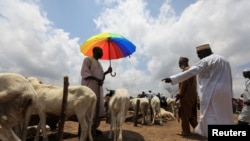In Nigeria, authorities are worried that coronavirus infections may spike again, as millions ignore safety measures such as wearing face masks and social distancing. A jump in infections could force another lockdown, hurting the economy.
Nigerian butcher Martin Olaiya, 45, strongly strikes the blades of his cutting knives against the other in order to attract the attention of customers.
It has been months since the coronavirus pandemic lockdown was lifted and this Utako market in Abuja is again operating at full capacity.
But among many concerns of business owners like Olaiya, the coronavirus pandemic is the least of them.
"Market is really bad," he tells VOA. "We don't know what the coronavirus is; we haven't seen it. There's nothing that concerns Nigeria with that. God will not allow it."
Many traders like Olaiya continue to doubt the coronavirus ever existed, and therefore are flouting safety rules.
Abuja resident Dorothy Iwuozo, who's shopping for groceries, is one of very few people wearing a face mask.
She says she's not happy that others are not taking responsibility.
"Look around you; you can count a number of people wearing face masks, people are touching meat, food stuff; they don't sanitize their hands," she complains.
Nigeria has recorded more than 67,400 cases of the coronavirus since its first one in February.
The Nigeria Center for Disease Control says the country reached its peak infections between July and August, and then recorded a downward trend.
But officials say coronavirus infections began rising again in November, as many countries began battling a second wave of the infection.
Chinwe Ochu, a director at the NCDC, worries that citizens, especially younger people, have stopped being vigilant.
"Males aged above 21 years and less than 50 years are more likely not to adhere to COVID-19 prevention protocols because they're usually the ones that don't have the severe symptoms," Ochu told VOA. "But these are likely to have the disease and transmit it to the vulnerable elderly groups or people with comorbidities who could die from it.”
COVID-19 is the disease caused by the coronavirus.
Experts attribute the new rise in cases to the “End SARS” protests last month, which saw thousands of young Nigerians march against police brutality.
The use and sales of personal protective equipment have also dropped significantly.
Nigerian authorities are trying to avoid imposing strict lockdowns by urging citizens to adhere to COVID-19 guidelines.
President Mohammadu Buhari has warned the country's already fragile economy may not withstand another lockdown. Economics lecturer Anas Ibrahim agrees with the president.
"About 60 to 65 percent of the 46 sectors of in Nigeria now they're actually declined, they're not performing, they're not actually lucrative to boost the economy in order to create more job opportunities and a lot of revenue to the government," Ibrahim says.
Last week, Nigeria's bureau of statistics announced the country had plunged into a recession after its economy contracted by 3.6 percent due to coronavirus disruptions.
Authorities say they are hopeful that the economy will begin to recover early next year but that citizens must act responsibly.









